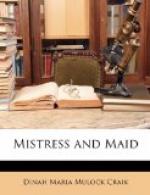“No,” said Aunt Hilary, “it is nothing of the sort: it is only that Ascott must now depend upon himself, and not upon his godfather. Take courage,” she added, and went up to him and kissed him on the forehead; “we’ll never let our boy go to the dogs! and as for this disappointment, or any disappointment, why it’s just like a cold bath, it takes away your breath for the time, and then you rise up out of it brisker and fresher than ever.”
But Ascott shook his head with a fierce denial. “Why should that old fellow be as rich as Croesus and I as poor as a rat? Why should I be put into the world to enjoy myself, and can’t? Why was I made like what I am, and then punished for it? Whose fault is it?”
Ay, whose? The eternal, unsolvable problem rose up before Hilary’s imagination. The ghastly spectre of that everlasting doubt, which haunts even the firmest faith sometimes—and which all the nonsense written about that mystery which,
“Binding nature fate
to fate,
Leaves free the human
will,”
only makes darker than before—oppressed her for the time being with an inexpressible dread.
Ay, why was it that the boy was what he was? From his inherited nature, his temperament, or his circumstances? What, or more awful question still, who was to blame?
But as Hilary’s thoughts went deeper down the question answered itself—at least as far as it ever can be answered in this narrow, finite stage of being. Whose will—we dare not say whose blame—is it that evil must inevitably generate evil? that the smallest wrong-doing in any human being rouses a chain of results which may fatally involve other human beings in an almost incalculable circle of misery? The wages of sin is death. Were it not so sin would cease to be sin, and holiness, holiness. If He, the All-holy, who for some inscrutable purpose saw fit to allow the existence of evil, allowed any other law than this, in either the spiritual or material world, would He not be denying Himself, counteracting the necessities of His own righteous essence, to which evil is so antagonistic, that we can not doubt it must be in the end cast into total annihilation—into the allegorical lake of fire and brimstone, which is the “second death?” Nay, do they not in reality deny Him and His holiness almost as much as Atheists do, who preach that the one great salvation which He has sent into the world is a salvation from punishment—a keeping out of hell and getting into heaven—instead of a salvation from sin, from the power and love of sin, through the love of God in Christ?
I tell these thoughts, because like lighting they passed through Hilary’s mind, as sometimes a whole chain of thoughts do, link after link, and because they helped her to answer her nephew quietly and briefly, for she saw he was in no state of mind to be argued with.
“I can not explain, Ascott, why it is that any of us are what we are, and why things happen to us as they do; it is a question we none of us understand, and in this world never shall. But if we know what we ought to be, and how we may make the best of every thing, good or bad, that happens to us, surely that is enough without perplexing ourselves about any thing more.”




